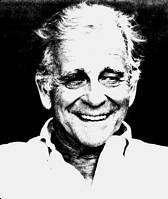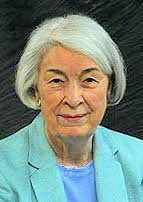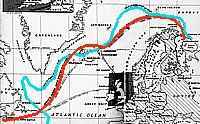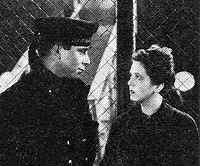



Jan de Hartog died in September 2002 at the age of 88. I've missed him ever since.
When, after WWII was over, Jan de Hartog returned to Holland and published Gods Geuzen, he discovered that the people there just wanted him to write Hollands Glorie over and over again. There was nothing left for him to do but start anew in another language. That's his story, at least. I'm not so sure—his later books were not exactly what you'd call flops in Dutch.
In an obituary, Dutch television had to say that "he made millions with his books and plays". This is of prime importance to the Dutch. (Jan de Hartog himself writes in The Hospital that everybody may think he's a rich author, but it just ain't so.) The same program tried to put him down by saying something like "he just wrote boys' books for grown-ups". Conveniently forgetting books like The Spiral Road, and lots more, where this does not apply to. Anyway, so did Stevenson, Forester and Mark Twain. They, too, wrote quite other stuff as well. What childish and seemingly willfully ignorant pettiness.
Below are listed the books and plays I know about, left, and their counterparts in English. Plus some comments you'll have to make do with. The funny thing here is that the Dutch never seem to have read the English versions, and, more understandably, vice versa. There are weird differences. Like Vladimir Nabokov, Ome Jan wrote in a foreign language. His Dutch versions get more and more anglicized as years go by; which doesn't matter too much as a lot of it is in Dutch-English sailor slang anyway. Some he never even bothered to translate to Dutch or were translated by others; some, like Mary, he just used as the basis for a really different book The Captain; still others never appeared in English. Correct chronology is very hard to come by, let alone dates of publication. With the gracious help of Marjorie de Hartog we have come pretty close, but I still do not feel these dates are really reliable. It's a mess for detectives, really.

| An editor's job is a very anonymous one. Kudos to Marjorie de Hartog who has edited all those books. You can be pretty sure that, without her support, Jan would have had a much harder job to make his transition to writing in English. Marjorie must have had a very important hand in the posthumously published A View of the Ocean. Then, she is credited as co-author in De Vlucht which has been written and, as far as I know, published only in Dutch so far. |
Like most writers, Jan de Hartog used personal experiences, tidbits of rumors and stories that were told him, in his books. (I certainly hope Edgar Allan Poe and Lovecraft are exceptions to the rule). It's funny, therefore, that for one of his most unlikable characters (in The Captain) he used the name Peacock, carried by the guy who'd abridged Hollands Glorie when it was published in English as Captain Jan.

Quaker reviewn by
Saul Bass
There's no getting round it, Jan de Hartog was a Quaker and I am an unbeliever. What can you say? Well, maybe something like this:—
The man never gets offensive, like those hated characters who gang up in couples on Sunday mornings and try to intrude the privacy of your home to force-feed you their views on the Bible (their capital letter). Did you ever hear about atheists who went out to pull the same dirty trick?
Interestingly, it seems to become obvious that the gap between believers and unbelievers is unbridgeable. Religious feelings reside in your frontal lobe - I try to explain more about this here. But it does look like the unbelievers have a 70% majority, so stand up and fight!
Having said all that, what a relief to read de Hartog's books on the Quakers and finding less saints in there than in Treasure Island!
| Under pseudonym F.R. Eckmar | Detective novels |
| Een linkerbeen gezocht - 1935 | |
| Spoken te koop -1936 | |
| Ratten op de trap - 1937 1981 AVRO hoorspel CD: Nederlands Audiovisueel Archief (NAA) | |
| Drie dode dwergen - 1938 | |
| De maagd en de moordenaar - 1939 | |
| Jan de Hartog vertelt in De Vlucht dat hij hierin heeft leren schrijven. Dan waren ze toch ergens goed voor. | As far as I know, there are no English translations of these. (Don't bother to learn Dutch to read them.) |
| ROMANS | NOVELS |
| Het Huis met de Handen - 1934 | |
| Ave Caesar - 1936 | |
| Oompje Owadi - 1938 | |
| Hollands Glorie - 1940 Over 38 editions, not counting the WWII underground printings. Dutch television serial in the 1970s starring Hugo Metsers | Captain Jan - 1942, UK |
| Gods Geuzen - 1947-1949 Trilogie | The Spiral Road - 1957 I - Mission to Borneo II - Duel with a Witchdoctor Filmed by Robert Mulligan as The Spiral Road, with Burl Ives and Rock Hudson. Mulligan filmed it in Suriname with old colonial Dutch types, who were very mad when the film was released, because he had fooled them into re-enacting a colonial party in Batavia, now Jakarta. (They ought to have read the book first). |
| Stella - Mary - Thalassa - Trilogy | - |
| Stella - 1950 More or less, but only that, the same plot as The Lost Sea. | The Lost Sea I/The Distant Shore I - 1951 First appearance of Marinus Harinxma. Filmed by Carol Reed as The Key with Sophia Loren, Trevor Howard and William Holden. Bloody marvelous movie. Buy it in letterbox only (if you can get it at all). |
| Mary - 1951 Wie dit in het Nederlands gelezen heeft, zou De Kapitein ook moeten lezen. | |
| Thalassa - 1952 | The Lost Sea II/The Distant Shore II - 1952 |
| De Kleine Ark - 1953 | The Little Ark - 1954 The 1953 Dutch Zeeland floods; later filmed |
| Scheepspraat - 1958 | A Sailor's Life - 1955 |
| The Call of the Sea contains The Lost Sea, The Distant Shore, and A Sailor's Life | |
| De Kunstenaar - 1959 | The Artist - 1963 |
| De Inspecteur - 1961 | The Inspector - 1960 Movie Lisa |
| The Sailing Ship — 1964 | |
| De Wateren van de Nieuwe Wereld — 1966 | Waters of the New World — 1961 |
| Het Ziekenhuis — 1965 | The Hospital — 1964 Disgraceful conditions in Houston, Texas hospital-and what to do about things like that, an exposé much like there are websites in our age to expose landlords who have slum conditions and not beautiful downtown Indianapolis apartments. |
| De Kapitein — 1967 |
The Captain — 1966 Based on the Dutch Mary May be his best book. Sold over a million copies in the USA (for whatever that's worth—Mickey Spillane sold much better). Like many of de Hartog's books, based upon historic circumstances: the Halifax-Murmansk WWII convoys. Fleet gossip had it that this convoy merely served as a decoy to lure Tirpitz out of hiding, and that ships and crews were callously sacrificed to the purpose of destroying Tirpitz. However, as it happens, he was wrong. Not that I feel that matters; if anything, it makes the book's concept stronger: you did not even get to understand really who or what you were fighting for. This is what The Oxford Companion to Ships and the Sea     has to say about Convoy PQ17: has to say about Convoy PQ17:
It sailed from Iceland on 27 June 1942 with a close escort of six destroyers, four corvettes, and two anti-aircraft ships, a close support force of four cruisers and three destroyers, and distant cover by the British Home Fleet. The convoy existed of thirty-six merchant ships and made good progress for the first seven days, passing north of Bear island, between Spitsbergen and the North Cape of Norway on 3 July. On this date the British Admiralty received intelligence that two German pocket-battleships, the Scheer and Lützow, had sailed from Norvik bound for Altenfiord, a temporary base in the far North of Norway.Another great book on the Atlantic convoys: C.S. Forester's The Good Shepherd  RED convoy route - BLUE pack-ice limit |
| Herinneringen van een Bramzijgertje - 1967 | - |
| De Kinderen - 1968 | The Children - 1969 |
| Het Koninkrijk van de Vrede I - De Kinderen van het Licht | The Peaceable Kingdom - 1971 I - The Children of the Light II - The Holy Experiment |
| - | The Lamb's War - 1980 The Peaceable Kingdom - IV |
| De Vlucht van de Henny | The Trail of the Serpent- 1983 discarded titles: The Pirate; The Flight of the Henny May partly have been inspired by HMAS Abraham Crijnssen. |
| - | The Star of Peace - 1984 based on play Skipper Next to God. |
| De Commodore | The Commodore - 1986 A Marinus Harinxma novel; one of his funniest. |
| - | The Peculiar People - 1992 The Peaceable Kingdom - III |
| - | The Centurion Marinus Harinxma definitely goes over the superstitious edge; a pity. |
| - | The Outer Buoy - 1994. Marinus Harinxma gets more and more superstitious. |
| De Vlucht - 1999 Met Marjorie de Hartog | - The story of his flight from occupied Holland, written with Marjorie de Hartog. |
| A View of the Ocean - 2007 Marvelous little book, describing his mother and her death. Especially interesting because he tells about his first contact with Quakers. | |
| TONEELSTUKKEN | PLAYS |
| De Ondergang van De Vrijheid - 1939 | - |
| Mist - 1939 | - |
| - | The Ark at Rest - pre 1940 performed years later in Kassel, Germany. |
| De Duivel en Juffer Honesta - 1941 unpublished | - |
| Schipper Naast God - 1942 published 1956 | Skipper Next to God Movie Maître après Dieu (France 1951) |
| - | The Rising Lark |
| Het Hemelbed - 1943 published 1953 | The Fourposter - 1951 Movie, 1952 - later turned into musical I Do! I Do! |
| De Dood van een Rat - 1949 published 1956 | Death of a Rat - 1946 U.S. title This Time Tomorrow |
| - | William and Mary - 1963 |
| MISCELLANEOUS PUBLICATIONS | |
| — | Ship’s Glory — 1955 Article in Harper’s Magazine |
| — | The Glory of the Sea — 1955 Article in The Saturday Evening Post |
| — | Robinson Crusoe in Florida — 1961 Article in Harper's Magazine |
| — | What Money Cannot Buy — 1966 Article in Atlantic Monthly |
SCREENPLAYS | |
| — | Ergens in Nederland — 1939 Producer Rudi Meyer, Director Ludwig Berger [Somewhere in Holland] — about the Dutch mobilization before World War II; co-stars Jan de Hartog and Lily Bouwmeester |

Jan de Hartog and Lily Bouwmeester
Ergens in Nederland
even more books

SEARCH this site or the Web

copyright notice
all material on this site, except where noted
copyright © by harrie verstappen , curaçao
reproduction in any form for any purpose is prohibited
without prior consent in writing